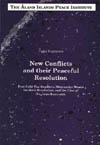Författare/Authors
Redaktörer/Editors

Slutet på Kalla kriget avslutade fyra årtionden av militär konfrontation mellan Öst och Väst. Ändå har inte slutet på denna kamp inneburit ett slut för väpnad konflikt. Våldet har snarare omlokaliserats från mellanstatliga relationer till mellan-samhälleliga relationer. Vi rör oss bort från den Clausewitziska treenigheten med stat, armé och folk. Konflikt mellan nationer har bytts ut mot etnisk-politisk krigsföring, där nationella gränser inte längre har en central plats. Det argumenteras i boken att traditionella Clausewitziska statssponsorerade förhandlingar och medling som ett sätt att lösa konflikter huvudsakligen syftar till att hålla tillbaka våldet på ett territroium, genom att lösa de djupa orsakerna till etnopolitiska konflikter. Nya sätt att tänka och alternativa metoder behövs för att hantera konflikter. Genom att studera teorin bakom konfliktlösning, utmanar boken de pessimistiska synen på möjligheterna för konfliktlösning efter Kalla kriget, och argumenterar att det finns modeller för konfliktlösning och konfliktförebyggande som passar hantering av etnopolitiska konflikter.
The end of the Cold War closed four decades of military confrontation between East and West. Yet the end of this struggle has not brought relief from armed conflicts. Rather, violence has shifted from inter-state relations to inter-community relations. We are moving away from the Clausewitzean trinity of the state, the army and the people. War between nations has been replaced by etnopolitical warfare. in which national boundaries no longer holds a central place. It is argued in the book that traditional Clausewitzan state-sponsored negotiation and mediation as a means of conflict resolution aims mainly at containing violence terriorially, by solving the deep causes of ethnopolitical conflicts. New thinking and alternative methods are needed for the purposes of conflict management By studying the theory of conflict resolution and by illuminating the theory with the Nagorno-Karabakh conflict, the book challenges the pessimistic views of the possibility of post-Cold War conflict resolution, and argues that there are models of conflict resolution and conflict prevention which are suitable for the management of ethnopolitical conflicts.


